The DOWA group identifies the input of resources and energy into the business activities of the DOWA group ("INPUT") and the output of products produced and the discharged amount of substances imposing environmental burden ("OUTPUT") in each stage of its lifecycle in a quantitative way and conduct business considering material balance.
In FY2014, overseas environmental impact increased compared to the previous year as 6 factories from 2 overseas locations (Thailand, India) were added. However, overall trend has not changed significantly. For more information, please refer to "Our Measure to Fight against Global Warming".
There are mainly 3 recycling in DOWA group.
First recycling is in-house generation and in-house utilization. Here, the waste material generated in our "Manufacturing businesses" such as smelting and metal processing is recycled in our "Environmental management and recycling business", and either sold or re-used as raw materials for the company.
Second recycling is carried out using scrap metal generated during processing in manufacturing plants of other companies. Receiving such material from customer factories that pay for our materials and parts leads to reduction in volume of new resource input such as by re-using the waste as raw material.
Third recycling is recycling of used final products. Through home appliance recycling, automobile recycling, and small appliances recycling etc., used products widely collected from the society are passed on to the society again as metal material.
In this way, The DOWA group strives for effective use of limited resources through three loops, starting with our company's production stage to the waste generated from society. At the same time, as a social responsibility in resource recycling, we aim for a sustainable resource circulation in consideration to environmental protection and energy saving, such as utilizing the heat generated in manufacturing processes as steam or electric power, along with striving to minimize the environmental impact at every stage in recycling, such as appropriate water treatment, detoxification of the waste, secure final disposal.
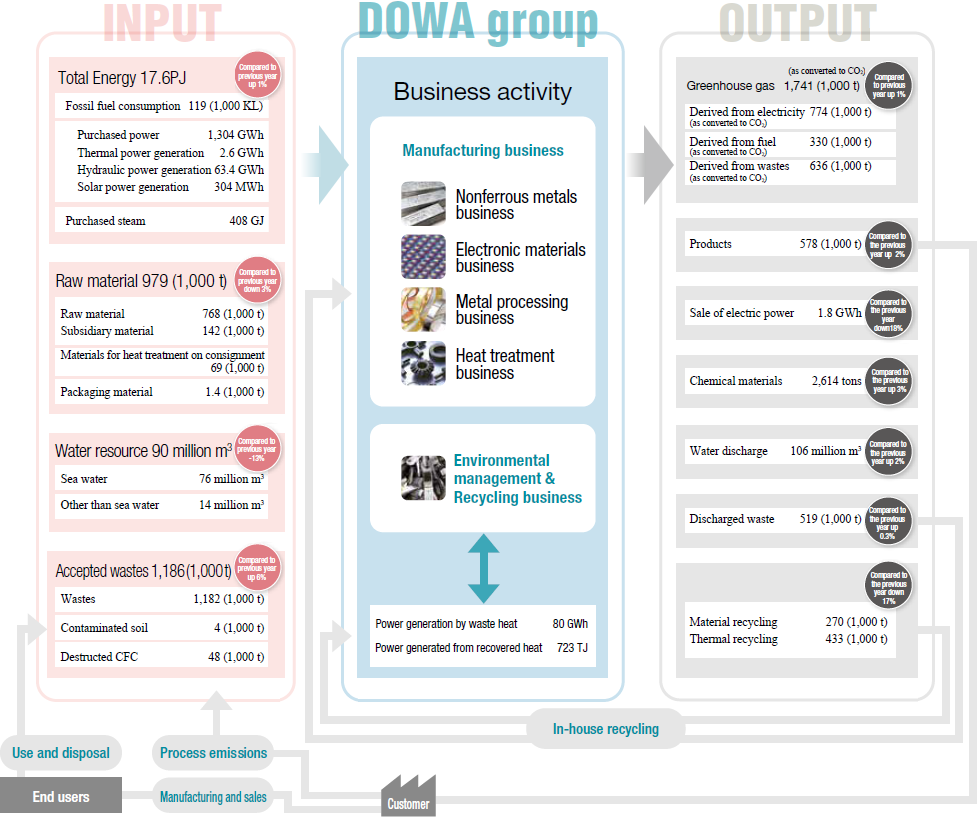
The DOWA group has pointed out that the efforts for environmental protection is an important challenge in corporate management and we have established "Environment Policy", and as a basic idea of this policy, we are promoting environment management throughout the Group.
1.We provide the products and services to customers (customers and regions etc.), which contribute to the establishment of a recycle-oriented society.
2.We reduce the environmental burden and environmental risk in business operations.
3.From top management down to the employee, we work together for environment protection activities.
<Environment Policy Website> http://www.dowa-csr.jp/about/csr_policy.html
The CSR department and the planning department of each business office, which perform the environment protection activity, carry out the environment management activities of DOWA group co-operatively. DOWA Holdings conducts the adjustments and compilation in between each business office and also carries out the environment management and compliance management as an entire DOWA group. In addition, we have acquired ISO14001 for major domestic production sites and international offices, and for proper implementation of the environment management, we are taking efforts for development assistance of internal auditors through the implementation of periodic internal audits & external audits and auditor training courses.
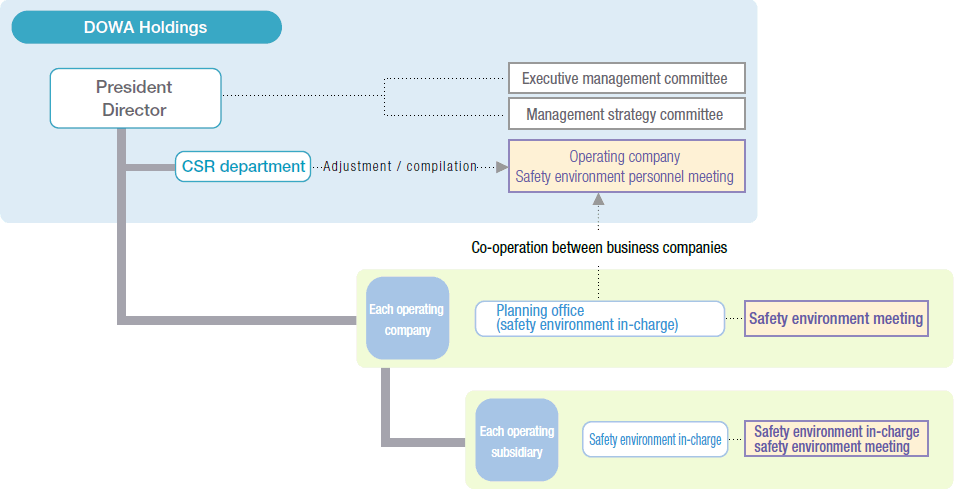
The DOWA group is working to increase the environmental awareness of employees and to strengthen the execution power to reduce the burden on environment by proactively conducting the environment management system (EMS) education. In each office, we are actively carrying out an environmental education including environmental law-related education, such as Act on the Rational Use of Energy & Wastes Disposal and Public Cleansing Act, training related to global warming, internal study sessions for environmental and social considerations etc. We also conduct environmental education and compliance programs for our business partners.
The DOWA Group has provided the opportunity to listen to direct opinions and requests from stakeholders such as briefings and council at business sites in Japan and overseas. In addition, we send the environmental information via home page and we are actively involved in participation in local environmental events, exhibitions etc.
In October 2014, officials from Thailand Ministry of Industry, which conducts management and guidance for the waste disposal, recycling and soil contamination, visited the Eco-system Hanaoka, Eco-system Akita and Eco-Recycle in Akita Prefecture, Odate city in order to deepen the knowledge about the waste disposal processing conditions and equipment in Japan.
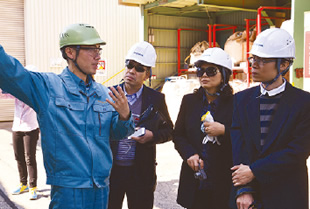
In September 2014, group companies in Akita Prefecture were exhibiting jointly in "14th Akita Eco & Recycling Festival", which was held at Agora Square near Akita Station. We addressed the importance of recycling and environment protection to local people who have visited the exhibition, through exhibiting the familiar metal products surrounding us and giving them the actual experience of weight of gold ingots that we manufacture.
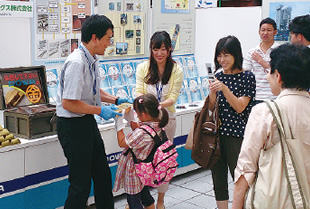
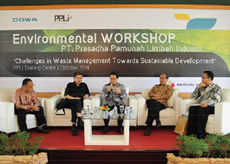
PPLi Company, which was founded in 1994, is the country's first and only environmental and recycling company having permission of final disposal of hazardous waste that conforms to international standards in Indonesia.
In October 2014, to commemorate the 20th anniversary, an environmental workshop was held with a theme of proper disposal of the waste and environment protection for future sustainable development. 200 participants including Kambuaya Environment Minister, former Ministers of the Environment and Indonesian government officials and major customers attended this workshop and lively exchanged their views. PPLi not only obtainedd a high evaluation from the participants for the high compliance and reliability in business so far but also a mutual understanding about the commitment to environmental issues has deepened further through this workshop.
The DOWA group is contributing to the creation of a sustainable society through energy conservation and renewable energy, reduction of hazardous materials, and research & development of materials such as metals, alloys, semiconductors and magnetic materials, which leads to higher efficiency and longer life of the product.
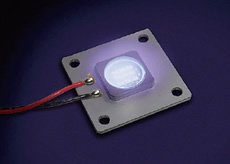
"Ultra-Violet Ray" is a light that is invisible to a human eye and has peculiar characteristic that it has a very high energy, and depending on its wavelength region it is used in many industries and medical cares for various applications such as sterilization (265~280nm), medical care (310nm), analyzing (265~340nm) etc. Especially in "deep ultraviolet LED" below 350nm, which is mainly expected in sterilization, it was announced that DOWA Electronics has achieved a high output and long life having world’s topclass in March 2015.
Conventionally, the light source of ultraviolet region was mainly the mercury lamp, usage of LED has merits such as longer life, power saving, space saving, and the most important is it leads to enabling a human body free from harmful mercury.
The DOWA group set a goal of "15% reduction of specific consumption of CO2 by 2020, compared to 1990" according to the Action Plan to Implement Low Carbon Society by Keidanren (Japan Business Federation) and the Japan Mining Industry Association (published as of January 2013) as a measure to fight against global warming.
Greenhouse gas emissions for the entire DOWA Group in FY2014, was approximately 1.741 million tons CO2 (domestic 1.682 million tons CO2 and overseas 59,000 tons CO2), which was almost at the same level as compare to the emissions in previous year in Japan. At overseas, there is an increase of approximately twice as total 6 factories added than FY2014, and greenhouse gas emission of the entire group was increased by approximately 1%.
<Derived from fossil fuel>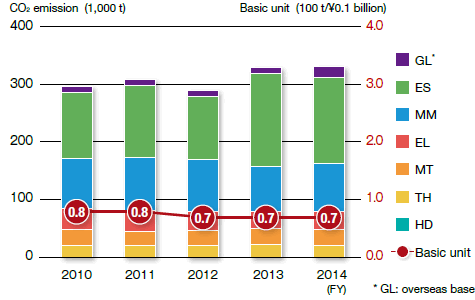
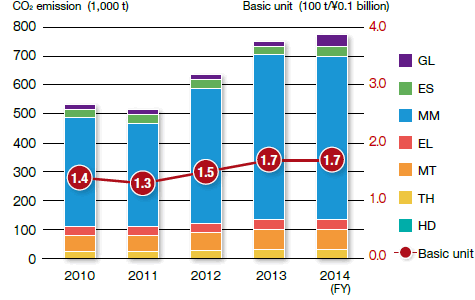
We accept wastes from other companies outside the DOWA group for incineration in our plants. Therefore, their CO2 emission accounts for a large part of our CO2 emission. As it is difficult to control the amount of wastes we receive from other companies and reduce CO2 emission, we try to increase thermal recycling through power generation using heat and steam from incinerating those wastes.
In addition to global warming measures such as energy conservation and fuel switching, we are actively promoting the use of renewable energy resources, which have less impact on the environment.
Power from waste is generated by producing a high-temperature, highpressure steam by "heat" at the time of incineration of garbage and turning the turbine. Currently, this type of power is generated at 5 places; 4 domestic and 1 overseas, and the amount of power generation from waste was 79.7GWh in FY2014, which was approximately 7% increase as compared to the previous fiscal year.
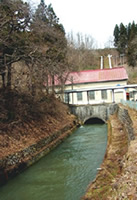
Hydroelectric power that utilizes renewable energy has become an important source of power to cover the energy requirements of our smelting business.
This power generation has started in 1897, and currently there are 6 hydroelectric power plants in Akita Prefecture. The amount of power generation in FY2014 was 63.4GWh, which shows approximately 6% decrease as compare to the last fiscal year.
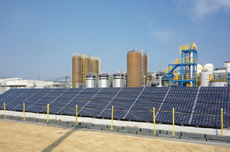
In case of solar power, though the amount of solar power generation is affected by weather, but it is useful as generated power volume can be confirmed in visible form, employee's energy conservation awareness improves and also helps in environmental problems such as global warming and energy problems.
Currently, we have introduced a solar power generation system in 4 offices in Japan, and in FY2014 the total amount of power generated by 4 companies was 304MWh.
* As a rule, the amount of CO2 emission is seek based on the emission factors in Law (Global Warming Law) concerning about the promotion of global warming measures for system power purchase amount, fossil fuel consumption and accepted waste. With regard to CO2 emissions from accepting waste, as calculation conditions are set while preparation of this report, it may not necessarily coincide with the reported value to the government. In addition, the classification of waste in Japan and overseas is different; it is difficult to set an appropriate emission factor for the accepted waste at overseas sites, so amount of CO2 emission of waste origin is displayed only for the domestic sites.
The DOWA group is contributing to the creation of a sustainable society, through controlling the consumption of natural resources as well as by promoting the cyclic utilization of used sources.
In FY2014, the amount of raw materials used was 0.979 million tons and it has decreased approximately by 3% as compared to the previous fiscal year.
<Accepted waste>In FY2014, the amount of accepted waste was 1.186 million tons and it has increased approximately by 6% as compared to the previous fiscal year. This is mainly due to the increase in acceptance amount at overseas.
<Products>In FY2014, the amount of products was 0.578 million tons and it has increased approximately by 2% as compared to the previous fiscal year.
<Discharge waste>In FY2014, the amount of waste disposal was 0.519 million tons and it has increased approximately by 0.3% as compared to the previous fiscal year and it was almost at the same level.
In FY2014, the amount of material recycle was 0.270 million tons and it has greatly decreased approximately by -28% as compared to the previous fiscal year, but as there was an increase in amount approximately by 29% last fiscal year, so we can say the situation has returned to the original average level. On the other hand, thermal recycling has decreased approximately by 8% and become 0.433 million tons.
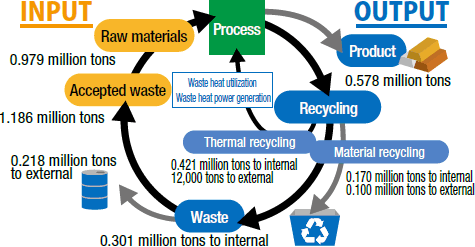
DOWA group has casted that the water is an indispensable factor and an important source in daily life, so we are implementing the measures, such as water saving or water recycling by taking into consideration the different water risk areas.
In FY2014, the amount of water resources input was 90 million m3, it has considerably decrease by approximately 13% as compared to the previous fiscal year mainly due to the decrease in usage of cooling water (seawater) in smelting process.
In FY2014, the total amount of drainage was 106 million m3, which was increased approximately by 2% than new office at overseas and as compared to the previous fiscal year.
In India, as compare to the expansion of water demand due to the population growth and the economic development, the development of infrastructure in many areas has been delayed; and in addition, the supply of safe water from the viewpoint water quality and appropriate wastewater treatment are the social problem.
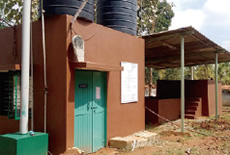
In HIGHTEMP company’s Nelamangala factory (Bangalore), which produces heat treatment furnace, we are strengthening the efforts towards the water recycling and rain water usage in addition to thorough enforcement of water conservation activities in the factory, for conservation of water environment.
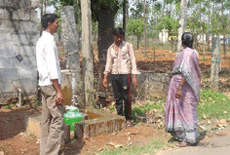
In Nelamangala factory, we are providing water from the wells in that particular area, so that the local residents can use the water for their daily needs.
We have setup an electric pump so that anyone can pump up the water easily, when water is needed gate is open any time and residents can use water any time. By providing the indispensable water in daily life, we have eliminated the work of bringing water from faraway places in two neighborhood villages.